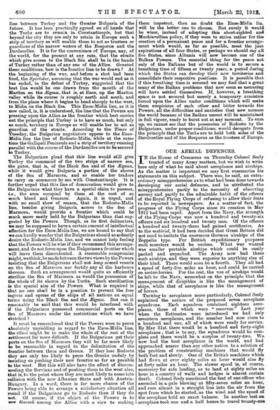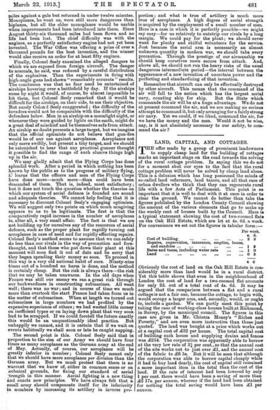OUR AERIAL DEFENCES.
IN the House of Commons on Thursday Colonel Seely treated of many Army matters, but we wish to write here only of what he said about aeroplanes and airships. As the matter is important we may first summarize his statements on this subject. There was, lie said, an extra- ordinary misapprehension as to what had been done towards developing our aerial defences, and he attributed the misapprehension partly to the necessity of observing secrecy and partly to the admirable habit of the officers of the Royal Flying Corps of refusing to allow their feats to be reported in newspapers. As a matter of fact, the progress of the Flying Corps since its creation in May 1912 had been rapid. Apart from the Navy, the strength of the Flying Corps was now a hundred and twenty-six officers and six hundred and twenty men. Of the officers a hundred and twenty-three had gained certificates. As to the materiel, it had been decided that Great Britain did not need to imitate the enormous German airships of the Zeppelin type. For British expeditionary purposes such monsters would be useless. What was wanted was smaller portable airships which could be easily packed and unpacked. The Army now had three such airships, and they were superior to anything else of their kind. There would soon be a fourth. They all had a speed of forty-five miles an hour, and could be carried on motor-lorries. For the rest, the use of airships would be left to the Navy, somewhat on the principle that the management of dirigibles is like the management of ships, while that of aeroplanes is like the management of horses.
Turning to aeroplanes more particularly, Colonel Seely explained the nature of the proposed seven aeroplane squadrons. Each squadron contained eighteen aero- planes, three of which were " reserves." Last year when the Estimates were introduced we had only seventeen aeroplanes, and the number bad now risen to a hundred and one, all of which were ready for service. By May 31st there would be a hundred and forty-eight aeroplanes ; that is to say, the squadrons would be com- plete and there would be a surplus of twenty-two. We now had the best aeroplanes in the world, and had approached nearer than any other nation to a solution of the problem of constructing machines that would fly both fast and slowly. One of the British machines which had flown at over eighty miles an hour would also fly at forty miles an hour. The slower speed is, of course, necessary for safe landing, as to land at eighty miles an hour in a country of walls and hedges is almost certain death. Colonel Seely mentioned the feat of one officer who ascended in a gale blowing at fifty-seven miles an hour, and rose almost in a straight line into the air from the spot from which he started, as the wind and the speed of the aeroplane held an exact balance. In another test an aeroplane took one and a half hours to travel twenty-one miles against a gale but returned in under twelve minutes. Monoplanes, he went on, were still more dangerous than biplanes, but all the older monoplanes would be usable when improvements had been introduced into them. Since August thirty-six thousand miles had been flown and no life had been lost. The chief difficulty was with the engines, as a perfectly satisfactory engine had not yet been invented. The War Office was offering a prize of over a thousand pounds for the best invention, and the winner would also receive an order for at least fifty engines.
Finally, Colonel Seely examined the alleged dangers to which we are exposed from foreign aircraft. The danger to arsenals, he said, was reduced by a careful distribution of the explosives. Then the experiments in firing with high-angle guns had shown" remarkably accurate " results. The conclusion was that no fear need be entertained of airships hovering over a battlefield by day. If the airships came by night it would, of course, be almost impossible to hit them, but Colonel Seely remarked that it would be difficult for the airships, on their side, to see their objective. But surely Colon-A Seely exaggerated ; the difficulty of the invaders would not be comparable with the difficulty of the defenders below. Men in an airship on a moonlight night, or whenever they were guided by lights on the earth, might do a great deal of mischief and be themselves safe from attack. An airship no doubt presents a large target, but we imagine that the official optimists do not believe that gun-fire would be of any use against aeroplanes. Aeroplanes not only move swiftly, but present a tiny target, and we should be astonished to hear that any practical gunner thought it possible to find the range of such elusive things high up in the air. We may gladly admit that the Flying Corps has done splendid work. After a period in which nothing has been known by the public as to the progress of military flying, learns that the officers and men of the Flying Corps have done more—much more—than could have been demanded of them. That is, indeed, most satisfactory ; but it does not touch the question whether the theories on which our system of aerial defence is founded are sound. and adequate theories. We cannot help feeling that it is necessary to discount Colonel Seely's engaging optimism. We will suggest only two points on which much misgiving appears to us to be legitimate. The first is that the comparatively rapid increase in the number of aeroplanes is, after all, a very small affair. The fact is that we are not building up for ourselves any of the resources of aerial defence, such as the proper plant for rapidly turning out aeroplanes in case of need and for rapidly effecting repairs. Colonel Seely's method seems to assume that we can safely do less than our rivals in the way of precaution and fore- thought, and that those who put down their plant at this moment will soon find it out of date and be sorry that they began spending their money so soon. To proceed in this way is a very old national habit of ours. Ninety-nine times out of a hundred no harm is done, and the method is certainly cheap. But the risk is always there—the risk that we may be taken unawares. In the old days when France was still our enemy we ran a great risk through our backwardness in constructing submarines. All went well ; there was no war; and in course of time we much more than overtook the start France had taken from us in the matter of submarines. When at length we turned out submarines in large numbers we had profited by the expensive experience of others ; we had wasted little money on inefficient types or on laying down plant that very soon had to be scrapped. If we could foretell the future exactly this would be an unquestionably ideal practice. But unhappily we cannot, and it is certain that if we wait on events habitually we shall soon or late be caught napping.
The second point is this. Colonel Seely said that in proportion to the size of our Army we should have four times as many aeroplanes as the German army at the end of May. Actually, of course, our aeroplanes will be greatly inferior in number ; Colonel Seely meant only that we should have more aeroplanes per division than the German army. But we must protest that there is no warrant that we know of, either in common sense or on &clinical grounds, for fixing our standard of aerial :lrength in this manner. Aerial fighting is a new thing and exacts new principles. We have always felt that a small army should compensate itself for its inferiority in numbers by increasing its artillery in inverse pro- portion ; and what is true of artillery is much more true of aeroplanes. A high degree of aerial strength is acquired by the employment of a small number of men. Here is a case in which it is perfectly possible—we might say easy—for us relatively to outstrip our rivals by a long margin. We could pay for the plant; we should never want for plucky and skilful volunteers for the service. Just because the aerial arm is necessarily an almost unknown quantity in modern war, we should take every precaution. Through the prestige of our ainnanship we should keep ourselves more secure from attack. And, above all, we should not run the heavy risks of the usual dangerous intermediate period—the interval between the appearance of a new invention of uncertain power and the perfecting and standardizing of that invention.
Remember that aircraft can only be effectually destroyed by other aircraft. This means that the command of the air will fall to the nation which has the largest aerial navy, counting ship for ship. But the State which commands the air will be at a huge advantage. We do not at present command the air, and we are making no serious attempt to command it, but only arranging for a fairly strong air navy. Yet we could, if we liked, command the air, for we have the money and the men. Would it not be wise, nay, is it not absolutely necessary to our safety, to com- mand the air ?















































 Previous page
Previous page